#Western mentality
Text
Merge Merits: My New Year's Endeavor
Understanding what shapes a human, and communicating successfully. 2023 was only partly successful for me, therefore I will walk a new path in 2024. Fiction novels failed me, so I will walk the path of non-fiction. That’ll comprise a book, webinars, and a consulting business. It’ll be about the philosophy I developed from my life’s experience: international, intercultural, interdisciplinary, and…

View On WordPress
#business consulting#cross-divisional#Eastern mentality#intercultural#interdisciplinary#international#interpersonal#leadership training#mediation#Merge Merits#philosophy#psychological non-fiction#team building#Western mentality#Yuki Carlsson
0 notes
Text
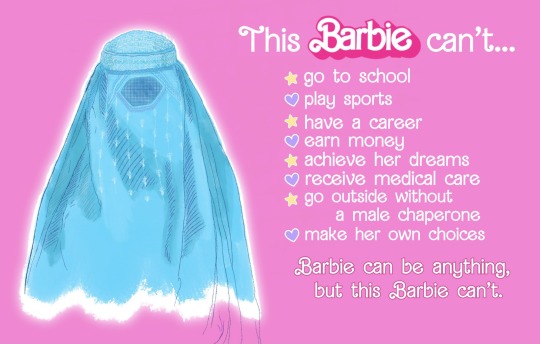
Please, don’t forget about the women in Afghanistan.
This image is not at all a commentary on Islam and/or of the different head-coverings that a woman may choose to wear while respecting her faith. Wearing a burqa/burka does not equate to an inherent lack of rights/freedom. This is also not a criticism of the Barbie movie. This is a statement about the brutal treatment of the women and girls in Afghanistan (as well as in Iran).
I loved the Barbie movie and think it’s a very important and empowering film. However, it is a bit jarring when I’m scrolling through my phone, listening to the Barbie soundtrack, and I come across an article detailing the mounting horrors these women face in these countries. There is so much happening in the world, and it all needs news time, but the virtual media silence on this topic is frightening.
Even though my country isn’t perfect (especially so after June of last year), it’s easy to lose perspective on how privileged I am.
The many different flavors of western feminism aren’t for everyone and every culture; to think so would be privileged and tone deaf. There is no "one-size-fits-all" kind of empowerment. But, objectively, what is happening to women and girls in Afghanistan and Iran is abhorrent and cannot be forgotten.
If Barbie can be anything, then Barbie can be an advocate and an activist. Do what you can, Barbies.
“I am not free while any woman is unfree, even when her shackles are very different from my own.” ― Audre Lorde
#political#this is a Star Trek (mostly) blog but Star Trek is activism so...#I rarely post political posts but this one will be an exception#Barbie is about more than just wearing pink and “slaying”#I can't girl boss while ignoring any and all girl bossing duties#anti hijab laws in some western countries are also shitty. no doubt#be as involved as you can while maintaining your mental health. Advocate for others but not at your own risk#politics#feminism#afghanistan#taliban#protests#activism#activist#barbie#the barbie movie#barbie movie 2023#barbie the movie#barbie 2023#news#media#world news#islam#muslim#feminist
700 notes
·
View notes
Text
By: Louise Perry
Published: Jun 8, 2023
When we get home from the supermarket, our two-year-old likes to assist with taking the groceries out from underneath his stroller and carrying them to the kitchen. He will pick up a carton of milk and heave it towards the fridge like an atlas stone. “Well done darling” I say to him in a pitch slightly higher than usual, “you’re being so helpful.”
Of course he isn’t actually being helpful. In fact, he’s slowing down the process of unpacking and risking an enormous milk spillage all over the kitchen floor. But my goal is encouragement and kindness – he’s only two, bless him, and that carton is awfully big and heavy.
My husband regards these exercises with more of a gentle briskness. “Thanks mate” he’ll say in his usual tone of voice, excising my white lie. In this, I’ve learnt, my husband is typical of other men. In a 2015 study led by Mark VanDam, a professor in the Speech and Hearing Sciences department at Washington State University Spokane, researchers outfitted preschoolers and their parents with recording devices to monitor social interactions over the course of a normal day. The mothers, they found:
… used higher pitch and varied their pitch more when interacting with their child than with adults. The fathers, on the other hand, did not show the same pattern, and instead talked to their children using intonation patterns more like when they talked to other adults.
As an instinctive speaker of so-called ‘motherese’ – that is, baby talk – I find that when our son mispronounces a word (‘tawtah’ for ‘water’ or ‘mulack’ for ‘milk’) I will automatically echo it back to him, while my husband will automatically respond with the correct pronunciation. These differences persist despite the fact that we share childcare almost exactly equally within our family.
It turns out we’re not alone in this sex difference, and that it may well have some adaptive purpose. "We think that maybe fathers are doing things that are conducive to their children's learning but in a different way,” writes VanDam, “the parents are complementary to their children's language learning.” Mothers speak down to children, while fathers speak to them like equals – in combination, these two kinds of stimuli promote the development of adult language.
The adoption of motherese is an instinct that, in its correct context, is both comforting and developmentally useful. But it can also, in some circumstances, be dysfunctional. And, as I have become more and more fluent in it, I have started to notice that motherese is no longer confined to the nursery or the classroom, but is now to be found also in public life. Not in its full expression – “have you got a boo-boo, honey?” – but in a more subtle form.
I heard a lot of motherese, for instance, in the responses to philosopher Kathleen Stock’s appearance this week at the Oxford Union – a political event considered significant enough to attract commentary from the Prime Minister and rolling updates on the homepages of several national newspapers.
Students at risk of being traumatised by Stock’s mild-mannered, centre-left brand of politics were ushered towards ‘welfare rooms’ offering ear plugs, bottles of water, and snacks. “The Union has made the choice to amplify a voice that actively harms trans students, trans people and the trans community at large” wrote one student politician, “we’re tired of [the Union’s] refusal to listen to the communities they hurt” insisted another. It was as if Stock was a rampaging bully on the playground, knocking other children to the ground, and her critics were leaping to the defence of the persecuted toddlers.
Witnessing the backlash against her, you’d never guess that Stock’s only sin is to offer a careful academic critique of the doctrine of gender identity – that is, the claim that one can become a member of the opposite sex (or some other identity category in between) merely by force of will. As she reiterated in her Oxford Union speech, to reject this doctrine is not to deny the humanity of trans people, but rather to balance their interests against those of other people, particularly women.
But I am by no means the first to notice an unexpected feature of the crowds that formed outside the Oxford Union this week, and indeed all of the crowds that congregate in support of trans activism (now a regular occurrence, and not just in the Anglosphere). While the occasional acts of outright aggression are overwhelmingly committed by men, the crowds in general are mostly composed of young women.
Polling reveals this to be a wider pattern. In the UK, women – and particularly young women – are far more supportive of trans activism than are their male counterparts. The same gap can be seen in US polling. The public figures who have received the most flak for their criticisms of trans activism are disproportionately women – I’m thinking not only of Kathleen Stock, but also of JK Rowling – and yet so, too, are the movement’s most devoted allies. This is, in the main, an intra-female conflict.
But if trans activism poses a threat to women’s interests – as Stock and Rowling insist that it does – then why have so many women come out in support of it? I want to propose two explanations for this seeming paradox.
Firstly, in socioeconomic terms, the women who have the most to lose from the disintegration of female-only spaces – prisoners and domestic abuse victims, for instance – are not actually the same women who are draping themselves in blue and pink flags outside the Oxford Union. This is a textbook example of what Rob Henderson has termed a ‘luxury belief’ – an idea that confers status on the rich, while causing harm to the poor.
But then I am begging the question, because why on earth would trans activism confer status on the rich, or indeed anyone? This is where we come to the second factor: the extraordinarily well-documented differences in personality that have been observed between male and female populations cross-culturally.
Note that there is a crucial distinction to be drawn between average and absolute differences. It is not true that all men or all women exhibit only masculine or feminine personality traits, in the same way that not all women are short and not all men are tall – rather, average differences between the sexes are obvious only at the population level.
One trait on which men and women differ substantially is agreeableness. To put it bluntly, women are usually nicer than men – that is, they are “more nurturing, tenderminded, and altruistic more often and to a greater extent than men,” as psychologist Professor Yanna Weisberg puts it.
This nurturing instinct often finds its way into polling on political questions. For instance, a typical study from 2017 asked 3,014 college students the following question: “If you had to choose, which do you think is more important, a diverse and inclusive society or protecting free speech rights.” 61% of male students chose to prioritise free speech, compared with only 35% of female students – exactly what you would expect from two populations that differ in this most crucial of traits.
Don’t think that I’m bashing agreeableness per se – it’s one of those personality traits that really does offer advantages and disadvantages all along the spectrum. Disagreeable people are often rude, but they can also be refreshingly honest; agreeable people are often pleasant, but they are easily taken advantage of. Think of agreeableness as motherese: soothing and lovely in the right circumstances, cloying and foolish in the wrong ones.
The problems arise when an agreeable style of politics gloms onto a group that seems to offer plentiful opportunities for babying. Right now, it is trans people who have found themselves in the hot seat (or the high chair). For just one example of this babying tendency in action, observe the progressive response when then-66 year old Caitlyn Jenner came out as trans (a response parodied exquisitely in a South Park episode titled ‘Stunning and Brave’). When Glamour honoured Jenner as the magazine’s 2015’ Woman of the Year' – despite the fact that Jenner had not yet lived as a woman for a full year – I couldn’t help but hear the high pitched notes of motherese (“you look so pretty sweetie”, “well done that was very brave.”)
Observe, too, the trans celebrity Dylan Mulvaney’s recent appearance on Drew Barrymore’s talkshow, which culminated with Barrymore kneeling on the ground, looking Mulvaney straight in the eye, and offering a heartfelt pep talk on self-love. Some gender critical feminists looked at this scene and saw a woman prostrating herself before a man. What I saw was a mother kneeling down to reassure a young child – for some bizarre reason, Barrymore was speaking motherese to a grown adult on national TV.
At the risk of stating the obvious, trans people are not babies. Nor are they pets. They do not need earplugs and snacks to withstand an academic discussion, and they do not need to be spoken to like toddlers. Real two-year-olds may benefit from the gentleness of motherese. The rest of us need to grow up.
==
https://policyexchange.org.uk/wp-content/uploads/2022/11/The-Politics-of-the-Culture-Wars-in-Contemporary-Britain.pdf#page=57
Women are more likely than men to say a trans women should be able to enter a women’s refuge, favouring this by a 36-32 margin while men oppose it 40 to 30. In fact, across all 6 questions pertaining to the trans issue (Stock, Rowling, refuges, gender identity, pronouns, teaching biological sex), women are significantly more supportive of the trans rights position even when ideology is taken into account. Women even exceed LGBT identifiers in their support for the pro-trans position on many questions.
Why? Is this not against the female interest? The likely answer is that women are more likely to be cultural leftists than men across most of the 25 attitudinal items in the survey. The inclination to empathise and care for groups perceived as vulnerable best accounts for the pattern. The result of the empathy dynamic is that the gender-critical feminist position, while intellectually prominent, is still a contested view among women. Indeed, the largest source of opposition to greater trans access to women’s spaces comes from cultural conservatives.
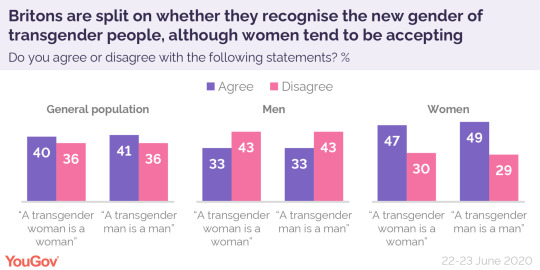
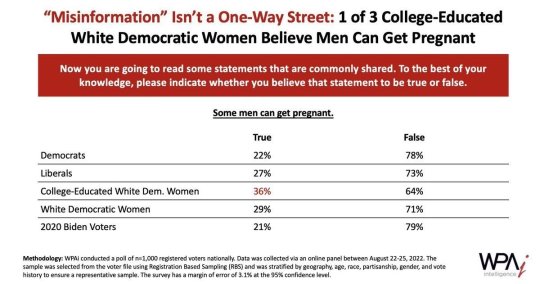
This isn't a war between men and women, as some would like to assert.
It's really a war between different denominations of feminism. Like Catholicism vs Protestantism. Or Sunni vs Shi'a Islam.
One thing that's hilarious and worth pointing out: gender-critical feminists will sometimes say things along the lines of, well that agreeableness was socialized into women by "the patriarchy" to make them compliant. Which means they're denying the same evolved sex-based differences that they started off defending. Like claiming to be a Catholic while denying transubstantiation.
Either sex-differences are real, and can explain different participation rates in physics and kindergarten teaching, different career priorities and trajectories (and thus, the mythical "pay gap") and different work patterns as readily as they explain differences in swimming, cycling and weight-lifting performance, making "the patriarchy" as unnecessary as a god is to the existence of the universe... or they're not, and the gender-critical argument goes up in smoke in the flames of social constructivism. God can't be both good and unknowable.
#Louise Perry#stunning and brave#gender activism#gender ideology#queer theory#genderwang#motherese#infantilization#mothering#western feminism#sex based differences#sex differences#religion is a mental illness
166 notes
·
View notes
Text
Thank you so much @tmkalp for creating that wild west au 🙏 and for being ok with me making my own :D
So here, have Chase being hog-tied to a train track!
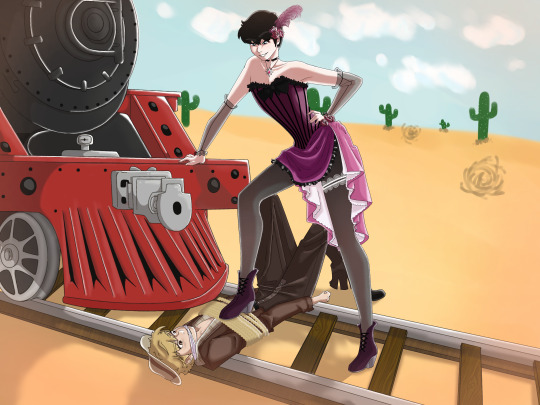
First things first(because you KNOW I gotta add a description to every image lol)
I hate that goddamn train. I'm gonna admit I traced the hell out of it and it took me hours??? It came out so ugly brooo
It's WAYY too small but not a single cell in my body is motivated to redraw it
Aight, train rant over
Buddy is supposed to be a western prostitute(the pants were supposed to be non-transparent fading into a transparent tone) because I couldn't think of any other villainess role in a western movie.
Not that I was more creative with Chase 💀
I literally just looked up 'western film female protagonist' and stole ideas off of there
Also yes, Chase is in extreme back pain
Buddy: Well hello there
Chase: *muffled insults*
#cinderella boy#cinderella boy webtoon#Buddy#chase hollow#western au#thanks again tmkalp 🙏🙏🙏#that train caused me mental anguish#let it burn in hell next to Vannessa#Originally Buddy was going to have a gun but I wanted to be done with this already#realy excited for the update tomorrow :DD#heard that it's gonna be GOOD#I might make another western au with both Buddy and Chase as competing saloon girls#imagine: While Chase is in the spotlight Buddy sits at a table in the back brooding#because 1. the attention isn't on him#and 2. because he's probably jealous of all the other men getting Chase's attention lol#he's so pettyyyy#I'm going to draw him getting an ward for pettiness next lol
75 notes
·
View notes
Text







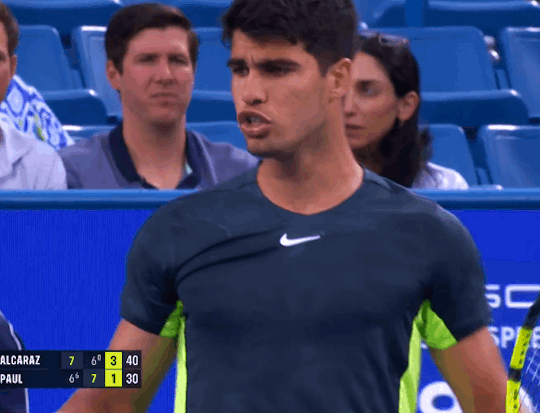


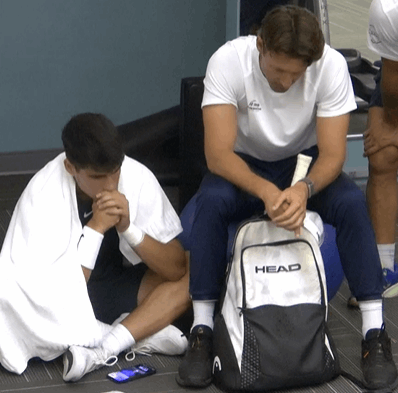


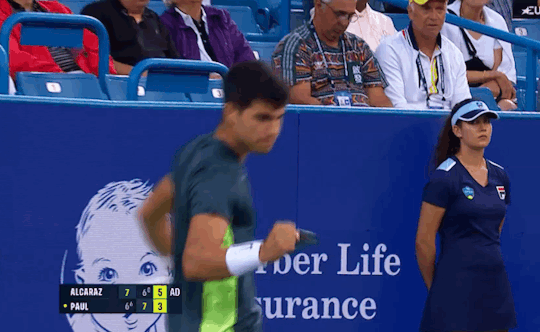
#how to train your baby dragon: spanish edition#carlitos & juanki#carlos alcaraz#juan carlos ferrero#special spanish baby#tennis#gifs#vamos 😌❤️#I'm not even sorry anymore ffs#rip Albert's mental health#Western & Southern Open
142 notes
·
View notes
Text
one of the most bitter ironies from a certain flavour of western (usually American, British, French) leftist who’se decided to comment on the Jews Writ large and just suggest that Israelis ought to have just gone back to where they come from if they didn’t want to be murdered is that the US, UK, and France been hugely culpable in forcing massive numbers of Jews, along with other middle eastern refugees, from their homelands through colonialism and interventionist and destabilizing policies in Iran, Afghanistan , Algeria, Lebanon, Yemen, and so forth. It’s downright ghoulish to refuse to wrestle with the history behind why the vast majority of the worlds’ middle eastern Jews live in the state of Israel when YOU, as the major colonial powers of the region, are culpable for it
#No I don’t want to hear from Yankees about Jews dying as a form of solidarity from their own actions actually#Everyone should be an anti Zionist#An essential and I mean ESSENTIAL part of that work is mentally reckoning with WHY Jews live in the state of Israel to begin with#Because otherwise? Kinda feels like the worst forms of gaslighting#Sorry we destabilized your homelands to the extent you were forced to leave as refugees AND refused to reckon with creating a global world#In which you could be safe!#Here’s someone else’s land. As a treat#All you refugees can be unceremoniously dumped here now have fun guys!!!!!#As an Ashkenazi but also tagalog Jew: there isn’t nearly enough intersectionality on Jews themselves as post colonial victims or how the#State ideology was founded in the first place#It’s extra bitter to hear simplistic takes from western leftists about how the Jews can just go home like#A) where? Where too?#And b. I don’t want to throw them this bone#But the vast vast majority of Jews who don’t live in isreal live in other settler colonial states#Because we were. Moved there#But for some funny reason those tend to be the states they live in and they don’t consider their own passports sufficient cause of dea#death. Or something
124 notes
·
View notes
Text

This is the old western state mental Asylum
In Bolivar Tennessee,
It's still there ---- alot of ghost stories,,
#Bolivar Tennessee#these haunted hills#Old western state mental asylum#ghostcore#ghost and hauntings#haunted#real ghost photos#ghost and spirits#haunting#ghost#appalachain mountains
45 notes
·
View notes
Text
it's crazy to me that there are people out there who still think that media and fiction do not affect how people think at all
#like that whole 'does fiction affect reality?' debate is so stupid to me cuz it's like#i mean just think about it for a second. what is propaganda? what did jaws do for people's perceptions of sharks?#i think studying the effect that popular media and fiction has on people in real life is really interesting#and it's crazy to me that there are people on the internet who think that it genuinely doesn't#like umm shoutout vit sisler for his paper 'digital arabs' i just read it for my game studies class and it's super interesting#about like orientalization how western shooter games' usage of middle eastern/muslim stereotypes as enemies created both a negative -#- stereotype for people who arent in that group and how it negatively affects the mental health and self-image of the people who are#also shoutout stuart hall and richard dyer they're really cool people and also have some super interesting papers on how representation -#- in media affects people's IRL perceptions of certain groups#i know online this focus tends to lean on that whole shipping discussion but i think it's more worthwhile to look at it on a wider scale#because 'does fiction affect reality?' is not just a 'fandom ship war' discussion it's like. the basis for many fields of study#anyways umm#liza post#actually this is more like a#liza ramble#i love tumblr bc i can write a one sentence post and put my body paragraphs in the tags#it's really late and i am tired ‼️ i wish i could be more concise i just adore my game studies class and visual culture studies in general
103 notes
·
View notes
Text

Riding the Rails
#courier micky#did I research railroad hand/lantern signals for this? Yes. Yes I Did.#a few nights ago as I was comin out of a dream#I suddenly had a very intense mental image of a western desert post-post-apocalypse set game#using steam locomotive driven trains that you flag down as the fast travel mechanic#along with mounts like horses and a motorbike to get around otherwise cause even half conscious I realized that could be a lil annoying#just as a gameplay mechanic#fnv but with more horses and trains (as it should have) and less nukes since the apocalypse for this setting felt like more of#climate and/or tech (either in the form of mass tech failure or a tech that ended up damn near destroying civilization)#so everything is hot and dusty and there's a cultural preference for non electric tech mostly as a justification for the steam choo choos#trigun 98 meets f:nv meets century of steam ass setting#and I think this might morph into Micky but with the serial numbers scraped off's new home setting#still a courier but instead of being a travelling medic he's a travelling engineer#both the train kind and the machinery and tech kind#puttin all this in tags cause it's still half baked and not ready to be spread around much methinks
17 notes
·
View notes
Text
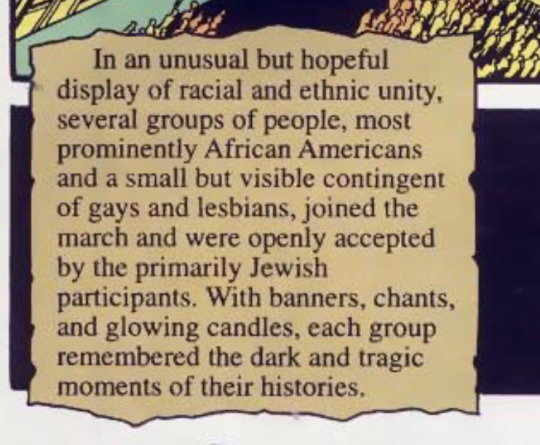
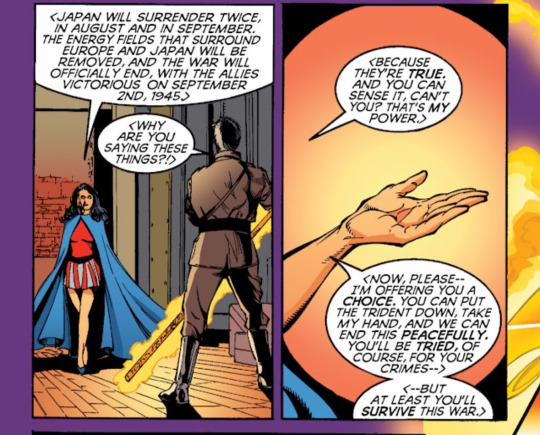
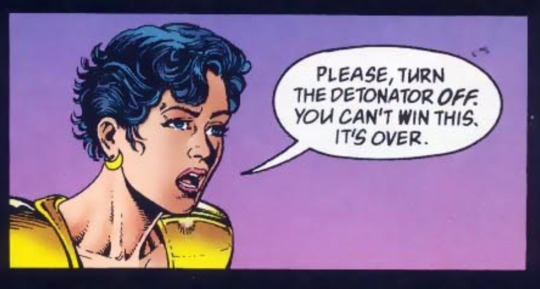
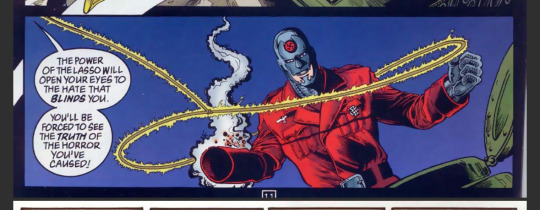
can phil jimenez for once in his god damn life, not be a disgusting liberal virtue signaler for once
using “unusual but hopeful” to describe holocaust victims, writing that 3 years after the oklahoma city bombing, and having the goddamn gall to wax lyrical about keeping the moral high ground.
are you really going to waste your time trying to reason with people who are beyond saving? god i hope he never becomes a hostage negotiator
progressive, but how much do you think DC comics pays him to create shit like this?
more importantly
what kind of person chooses to waste their time writing and openly drawing nazi imagery?
#capitalism#moral decay#anti capitalism#western liberalism#anti liberalism#liberalism is a mental disorder#dc comics#corrupt industry#virtue signaling#politics#leftism
9 notes
·
View notes
Text
I know that Steph's death was retconned to have been faked and that she only haad a near-death experience—and, yes, I prefer this version of events because while it's extremely doubtful that Leslie would ever pull this stunt, it's at least morally correct for Bruce Wayne's loved ones to lie to his face and mess with his ego—
But I'm not on board with saying that Cass reuniting with Steph in death was just a "hallucination". No, Steph wasn't among the spirits of the dead. But I like the think that rather than Cass having a close encounter with a spirit of the dead, instead Cass as a spirit of the dead visited Steph's dreams.
In dreams and death, the line between the reality where Steph survives and the almost-reality where she died is blurred. But love and comfort and bonds between souls are the only things that are truly real.
#Stephanie Brown#Cassandra Cain#Cass and Steph#The other theory I like is Death Of The Endless adopting Steph's form to comfort Cass.#Was going to say ''delusions'' in the Buddhist-ish sense‚ but I didn't want it to be taken as the mental health sense.#Was also going to mention the ''delusions lf the material world'' but I didn't want it to be taken in the Gnostic sense exactly.#Feel like a lot of Buddhism is framed as western Gnosticism. Won't argue against that here. But it's not... accurate either...#Not me getting metaphysical lr whatever in the tags. The DCU doesn't have some strict cosmology.#It's just that hippie power of love mush. The non-denominational feel-goodism popular across focus groups.#That's what this post is about.#In dreams and death#the line between the reality where Steph survives and the almost-reality where she died is blurred. Here the borders and the illusions of t#yet love and comfort and bonds between souls are the only things that are truly real.
11 notes
·
View notes
Text
the western sydney work ethic, mental health, burnout, inequality and ableism
inspired by ashton irwin on artist friendly with joel madden and 17902 sustainable urban development at the university of technology sydney
I’ve teased the idea of writing this post for a while now, and now I’m sitting in my borrowed bed in Sydney with the graphs and maps from my course still at the back of my eyelids and still processing the Vibes of catching up with my childhood friends and wondering if it’s too early to go to bed if the sun’s still up—it’s time to let it out. Because I found a bunch of seemingly unrelated things and put them together in a way that helped me process my upbringing and the way it’s positioned me as I go through life even now.
For background of this post, the Greater Sydney metropolis has a very stark rich/poor divide, where a large strip from the west going to the south of the city have been left behind in a variety of ways. In my uni course I see the maps on income, education level, job overqualification, crime, violence… they’re nice and set out, and they validate what I already intuitively knew—just like everyone who grew up in the area I’m going to refer to vaguely as Western Sydney. These graphs put words to something I’ve lived when I was too young to process it, something I hear the impacts of in 5 seconds of summer’s songs like I’ve never seen in any other art ever.
I know many people relate too and I don’t want to say you have to be from Western Sydney to get it. There are plenty of other places with similar trends, but this strip of suburbs, half a city, is where I grew up and the case study I’m going to use for the phenomenon I’m going to describe in this post.
Having spent the last decade and a bit in a more conservative, more sheltered area of suburban Brisbane, where people take it slow and at least attempt to have fun without getting completely wasted; where people have high expectations for their lives and livelihoods they never quite meet and where they’re the kind of emotionally aware that you hear all about how stressful that experience is: this was the backdrop of my teens and young adult years to this point. It’s where I learned about mental health and neurodivergence and ableism and where I really explored what faith and spirituality is to me. It’s where I never quite felt comfortable when people were too polite, where I poured all the belief they had in me as a gifted kid plonked into that environment I wasn’t native to into the delusion that I could deconstruct the unequal education system of their own creation if I only worked harder than anyone had ever worked before. Then they would finally listen. It’s where I tried and tried to get help for my mental health and wasn’t listened to either, not when I presented so well and was simply unable to unmask until I was unable to mask at all. Where the slightest bit of hope caused me to forget everything that was hurting me, making it a struggle to work through even to this day. where I wondered if I was some superhuman for the fact that I can work my ass off without even realising it’s hard work, a smile on my face and arms open for connection as always (the mark of health they say) while being desperately unwell, hurting, thinking I had it good compared to some of the people I’d see crumple under the pressure, I should be kind to them (not understanding why I found them so, so relatable).
I am not a freak of nature, or superhuman, though I am neurodivergent and twice-exceptional. I am the product of my upbringing and my ancestors. I carry generations of culture from hectares of foreign lands my ancestors made their homes on (ethically questionably in some cases I do acknowledge) and became part of the ecosystem of. It is, like most difference, a gift and a curse. Something that makes certain measures of ableism not apply to me, but creates others in their place. I’ll get into this more later.
in the strip of suburbs united by demographics we call Western Sydney, farmers from the notoriously difficult land of the Murray-Darling and immigrants from everywhere on the planet, some Indigenous but few Indigenous to Australia, make up classrooms, neighbourhoods, workplaces. Think I Am Australian by The Seekers, but just the verses, as a snapshot of some of the stories representative of the people. Interwoven in the landscape. We celebrated Harmony Day on the 21st of March in my primary school. Everyone had a different cultural background. We heard different languages spoken on the street. There were stereotypes. There were scared people trying to find their tribe, build a life in Australia, away from the larger scale farms, get their kids a good education to do a trade or go to university. Fear and angst and hurt coexisting with an appreciation of the juxtaposition of others you’d never head admitted out loud. But the second verse of the Australian national anthem was written just for us, or might as well have been. Beneath our radiant southern cross, we’ll toil with hearts and hands… google the lyrics, you’ll get it, you’ll see why I wish the rest of Australia did too: for those who’ve come across the seas, we’ve boundless plains to share, with courage let us all combine to advance Australia fair…
No one with the power to acknowledge this I interact with these days remembers the second verse. Except 5 Seconds Of Summer, in their ridiculous little promo videos, who I’d bet the rubble that’s left of my parents’ old house as the new owners turn it into a mansion because Gentrification, have no idea of what a meaningful gesture that is.
I can feel the wounds of being torn from the good parts of that experience closing over. And so it’s time to give the often forgotten stories on an often forgotten piece of land that made me and also these four wonderful humans who we are today, the credit it deserves. Start by telling our stories.
One thing I love about Artist Friendly is it cuts straight to it. Joel Madden is just incredible like that—in a world coming out of the 2010s pop decade of dancing while the room is on fire (bloodhound, 5sos) put your rose coloured glasses on and party on (Katy Perry’s chained to the rhythm) (these I would consider more analytical quotes of the era, one whose vibe was ‘forget all the pain in the world, let’s party and sing about how horny we are’ which for all my cynicism I did find fun)—he kept up his punk edge, kept investing in new musicians, searching for and investing in what’s real. He also really loves Australia, and when you put our underdog-supporting attitude next to Good Charlotte’s songs you understand why. Anyway, the episode pretty much opens by him asking Ashton about his background, and relating from the perspective of working-class-emotionally-unavailable/immature-parents-who-showed-their-love-through-provision-and-really-did-try-to-be-there-but-had-none-of-the-resources. I like the positive take. It’s high time we stop being classist and ableist towards the people who’ve met our needs as much as they were able, but it still wasn’t enough. Who taught us how to take opportunities, work to prove our worth, and through it all couldn’t even afford therapy.
I used to think my family was rich because we lived in Australia and my parents had gone to university. Never mind the fact that I was born when they were barely older than I am now. Never mind the mould in the walls or sneaky Tuesday night washing of the school uniforms in the summer when we got sweaty and there weren’t any spares or the mismatched bargain bin clothes we wore or the bedroom I shared with my sisters. I knew the people I compared us to. And now I do really believe if I’d grown up a bit less frugal or even a few k’s out of the area I did I wouldn’t be who I am. I wouldn’t have the perspectives I have, nor would this podcast episode have me feeling so seen. Like, yes I lived a bit further into the city than these guys, close to the train line without any farmland where the house values shot up seemingly overnight and meant the area I grew up in is experiencing a very weird disparity as two cities collide within it today. But we grew up in the same era in western sydney, we grew up loved and knowing that was a privilege and we grew up knowing from a very young age we had to spend our whole lives working hard if we wanted life to be manageable and we better be polite and better not ask for too much.
yet we also grew up with hurt. From the trauma we inherited from our caregivers as we encountered the attitudes and fears with which they faces the world. From what we saw our peers go through much too young to be able to draw boundaries with the empathy we felt too much of and understood nothing of. From broken family relationships that were all too common. From religion that hurting people used to cause or at least stagnate hurt instead of healing.
when I was burning out and struggling as an unrecognised neurodivergent I used to wonder why my father would place such value on the Protestant work ethic when Jesus died exactly so we wouldn’t have to strive. And I acknowledge that the PWE is harmful to many disabled folk or literally anyone who has experienced the demands of life and had their stress invalidated for it. Including myself. But never having the expectation of a life of ease and luxury? I do appreciate that. It’s given me a whole different metric for how I view life, one none of my friends except those who are from those years of my life understand. No one in Brisbane or my online international friends seem to get it. But I’m sure when you see yourself in this post, that some of you will (we might be the largely unheard minority but I’m sure we exist. Joel Madden is proof of that). It’s given me a differently calibrated emotional pain scale in many ways. Different standards for when the warning lights come on (and I’m very perceptive of angst and disappointment and always see them in others to be worse than they are because of it). And when I look at everything this band has accomplished, I know it’s the same for them.
I have spent a lot of time these last years advocating for neurodivergent acceptance. I’ve done so in a way that made sense of the decade previous, of existing in a world of inequality I’ve always been so sensitive to and of expectations that I took on as opportunities (because what else have I been trained to do)? And yet so much of it is about funding and resources. And when there isn’t that? You make room for my favourite thing ever: grassroots, unofficial but beautifully organic loving neurodivergent affirmation. Plenty of rural folks, my grandparents included, hate labels, prefer focusing on strengths and equipping young people based on those than accommodating difficulties. They’re often seen as conservative, bigoted, ableist, and some of them are. But they bring with them an important lesson about how to live with the realities of the economy that they struggle in too, too much to support someone else. They don’t have the same impossible expectations of their neurodivergent progeny and protegees and community members that many who hold in their heads an idea of perfection they hope to bring to their families do (the kind of things sometimes only a diagnosis can free someone from, and nothing from the memory and shame of) and that—that is an important attitude for all of us to have.
Some people are unconventionally neurodivergent affirming while knowing none of the terms, or maybe trying to hold off using them because of the same economic and confidence reasons I’ve tried to unpack. Some rely on simple kindnesses and explanations that centre around possibility, and go nowhere near deficit. Some people know intuitively or through hard life lessons themselves (usually the latter) the value of stripping all but essentials from the functionality of everyday life. Not making it any harder than it is.
Of course you can drum on the tables in math class. My son is a musician, I get how it is.
Liz Hemmings is the only valid neurodivergence parent—I’ll say no more, it is how it is
Sometimes when we advocate for things we have to be aware that the way the dominant in-power often wealthy culture has figured it out isn’t always the best way to do things. Environmentalism is a prime example of this. This is why we need brown environmentalism and to decolonise and listen to our Indigenous stewards and share power.
You can take a lot of lessons from a place that’s as culturally diverse as Western Sydney. And you can see how a work ethic is facilitated, rather than gatekept. You can see why Ash, when asked by Joel if he’s scared of every getting back to that life (ref to poverty) his attitude is actually one of gratitude and almost reverence for the place that shaped him, that brought the band together and everything that came from that point forwards. That shaped their attitude and birthed the grit that got them through being on tour with one direction and I don’t think he said it but in Ash’s case I bet the empathy he has for the fans and the way he just wants to connect and create a fun experience but also one where we’re deeply seen by moving songs is because he knows what it’s like for so many people. You can’t not if you grew up like we did. You can see why Luke at any chance will say ‘we’re from Sydney Australia’. It has a way of sticking to you, the rich culture that’s a patchwork of orphaned cultures, the way everyday life is like one of those adventures you emerge from with strong bonds usually only found in fantasy novels. You can see that the band is proof that those bonds exist in real life.
after a decade and a bit pretending I know what leisure is and how to have fun without Bad Angst I’m glad that this proof is still in my life. I’ve still got close friends from primary school and few can boast that (we might not quite be Calum and Michael in that regard, but they still have other friends from primary who they’ve kept in touch with despite geographical separation as I have).
Now I’ve acknowledged this and traced the strings that are much easier to see when my own life is mirrored in a podcast episode, maybe I can find the good among the cultural dysphoria in the circles I do have in Brisbane, and do value still for what they are even if they’re not quite the same. Now that I can see how a world of too many opportunities and not enough freedom can burn someone out who came from this background, with the type of brain that flourishes on being a latchkey kid and sketchy hangouts with deep conversations and questionable substances but crumples under expectation and too much choice and politeness, I can put my life back together in a way that validates who I am and where I come from, rather than what those around me tell me should be good for me.
as, I can tell by this interview, these guys have. I want to be able to talk about suffering without people acting like it shouldn’t be something we can comfortably say out loud, as Ashton does here and through music. My art isn’t quite the same, but the purpose behind it is so, so similar. I relate a lot to the importance he places on spirituality, even if I’ve tried to do something with Christianity that it, in the mainstream at least, isn’t built for and probably can only partially do on its own. Maybe the epitome of humility is being able to learn from other religions and see them as gifts from God even as, and I include Christianity here as well, anything can be dangerous if used in a way that it wasn’t meant for: anything with power to heal has power or hurt too. I’ve got so much respect for how Ash does it. I think this episode really cemented for me that, and I feel like it’s something we as a fandom don’t talk about enough because of their characterisation (and fair enough, if you’re famous you don’t want people dissecting every part of you, and I’m not going to do that just give a generalised compliment): these guys are so incredibly resilient and intelligent and invested in creating healing and they’re really fucking good at it. They might present themselves as goofs with one braincell that create bops and fan over other celebrities as if they themselves aren’t famous too, but so much of that is humility and them baring themselves in ways that are sustainable and really emotionally mature (for the most part) to be relatable to us as fans and invest in making that connection genuine. They’re not pretending, because they understand how it is to be human.
and you don’t get there by being some sort of Untouchable Philosophical Genius Figure. you get there because you’ve lived in community and you’ve survived hard things because of other people who’ve done similar and created authentic art too. You get there often because you have to: because putting on a fake show and doing stuff for likes and popularity was never going to work and will only screw you up in the long run and you’re worldly enough to see that from a young age and learn from your own intuition and empathy and experiences. You get there because you lived your whole life being resourceful and being street smart and doing what it takes to make good decisions and invest in yourself (who else do you have who’s worth more than that) and your future. Doing what it takes to make sure you’re alive to learn how to do better at things you’re behind in that might keep food on the table in the future, because there’s none of that oh-it-won’t-happen-to-me attitude. That part is very sustainable which I love. I also really really relate to it and have found it something I would get complimented on when I was younger, too young to be so mature. But I never attributed it to myself. I knew somehow, abstractly, I was disabled and nearing my limit and everything I do I did so I could survive. It’s the western Sydney work ethic.
and yet this often beautiful phenomenon has its ugly side. If you know you’re neurodivergent even without the words—more often than not the only people you see who you relate to are those who didn’t make it, who fell off the horse of functionality and into things like addiction and other things that exacerbate the inability to empower yourself. You figure that when you’re honest with yourself you’ll be dead by 25. Sometimes you give up on trying to prevent that and wonder if it’s even worth it to attempt to keep going: is your life really worth that effort?? What I’ve described is a combination of the experiences of many people I know, aspects of it are mine, and aspects mirror things I know these guys have mentioned about themselves (I’m going to leave it at that vague level of detail). You wonder why people believe in you, is it only because any other option is unmentionable? But what if you let them down like you know (fear) you will? And burnout is the epitome of this: the need to let go of trying. And without a decent amount of privilege it’s impossible to return from.
I’ve been there and scrounged at straws of privilege I do have, pretending I’m doing my job to the level that others expect while letting go of every expectation I have on myself. Still problem solving outside every box on how to get back on my feet because I know nothing else, radically accepting that I might not and whittling down all my needs in life to the most essential, that I might still survive even at my limited and diminishing capacity. While always relating to those our society sees as failures. I’ve borrowed from other cultures that aren’t my own to have a stubborn sense of worth while trying to keep afloat in a society and economy that says it’s conditional. My spirituality comes in here, as do my problem-solving skills: again, maybe this culture fears burnout more than anything, but maybe it has half a toolkit on how to get out of it. Only half. I have to pair it with what I learn from others too.
and even through that, I’m immensely privileged to have savant skills and a generally able body. Just like when you make it big as a musician you’re privileged by that. Against a backdrop of I’m-nothing-special. I’ve always struggled with questions of my felt worth, because I’m so conscious of my privilege and ability that sometimes I get the two muddled (though I know my ability doesn’t define my worth in things I do poorly at, and my persistence technically doesn’t either but I’ll be damned if I don’t try and try and actually find doing badly more validating of how I see myself than when I do well, so I chase it again and again, my dad is the same, it’s what makes us so adventurous). I understand the consciousness of things that are going well not lasting, and pouring creativity for new ventures into things like selling candles. Instead of letting achievements make me believe I’m someone more important than I am, using them as ways of giving myself space to do whatever’s next, dial off the pressure a little bit.
I understand appreciating others’ sensitivity and the social capital they bring everywhere rather than their material wealth or achievement and when Ash praised Calum for that and said it made him look bad I felt that. Both the experience of being that counter-cultural person who doesn’t give a shit about money but values connection so, so much more (and from all I’ve written, you can see why, can’t you) to still never being able to be as good a person as I see the need for in the world.
I understand missing family and constantly grieving that, as I weigh up the city of my childhood with the friends and culture I love versus the city of my youth with my feathered family who are my children and who I hate to miss birthdays of and the like, same goes for my sisters and parents and grandparents, the way Ashton, the only band member with younger siblings, hates missing all their milestones too. I feel privileged that Brisbane and Sydney are so close to each other and nothing in my life is as far as Los Angeles. I understand the nostalgia for Sydney. This whole post is proof of it.
I understand the unbreakable bonds between people who make this kind of art together. I understand putting disagreements on the back burner and realising the connection through writing is so much bigger and the connection can overcome whatever is going wrong. Heck, I feel privileged to understand and relate to how such brilliant brains work (nature: neurodivergence I won’t go any further into as well as nurture) as well as the environment that made them what they are.
all my life I’ve longed for that kind of community and connection I’ve seen largely in fiction, sometimes between people in real life. And I think having written this analysis (it’s taken me til my bedtime or later) I do have all the ingredients there. All the ability to make it, both in the practical way I relate to and am there for my friends and whatever I do in my silver bridges tag. In the neighbourhoods I eventually design that foster communities with all the good parts I’ve described but without the inequality and minimal poverty and hurt and violence. To everyone who’s shown me these things in myself that are so worth working for and I know I’m not savantly immediately good at, I am so so incredibly grateful. the city as a whole. My family and friends. The celebrities I grew up nearby and those who invest in people like them. People like me. May I keep investing in people: people like you. because what is humility but knowing there’s always something to learn, and what will bring all of us forward but learning it and putting it into practice in love and empathy that drives a grit that no amount of striving for striving’s sake can manufacture?
#western sydney#western sydney work ethic#neurodivergence#burnout#personal mental health tag#ashton irwin#artist friendly interview#5 seconds of summer#calum hood#luke hemmings#michael clifford#5sos#community#urban design#growing up poor#I did a big analysis and I will do this again#5sos5 city#silver bridges#neurodivergent liberation
20 notes
·
View notes
Text
just paid half my rent to daniel ricciardo


#i was gonna buy a new winter jacket this year but i guess im wearing the western jacket all winter#lets see how it holds up in a toronto february#i have a serious mental illness bc i’m considering going back and buying more from him 😭#i can ship it to the US this time so it’s basically free bc i don’t have to pay like $150 in duties
23 notes
·
View notes
Text
Hello and welcome to the Hamas experience!
This room shows you what it'll be like once Israel loses. Hope you guys are excited!
Anyway, since Sharia Law is enforced inside, we'll have to verify a few things:
First of all: are any of you not Muslim? Ok, so you'll have to convert before entering.
Second of all, I see some women here. Ladies, when you wear your burka, make sure only your eyes are visible. Everything else must be covered. Also, please remember that women are not allowed to drive, and you must have a male guardian when traveling. Oh, and if you do decide to travel, please be very careful of where you're going, since entrance for women is restricted in many public places.
Also, don't let anyone see you read, they really hate women learning. Or singing. Or talking. What else? Oh, if you get pregnant, you can't have an abortion and if you get divorced you cannot get custody of the kids.
I feel like I'm forgetting something.
Oh yes, and this is for everyone: no alcohol, no music, no public display of affection, no sex outside marriage, no gays of course.
And I think that's pretty much it.
If you're still not sure, then here are some pictures of Afghanistan before and after Sharia Law, and the same with Iran, you get the idea.
Okay, I think you're good to go, have lots of fun. Oh, and don't forget to visit the town square. Today, we're stoning an atheist, beheading a guy who tweeted something bad about the government, throwing some gays off the roof, chopping the legs of a girl who showed some skin, cutting the tongue of a poet, and removing the genitals of a couple who kissed in public.
Bye, hope you have a Jihaday!
The westerners who get upset that the names of birds aren't "inclusive" enough and lost their minds when Elon took over Twitter, chant "free Palestine" to cheer on the expansion of a murderous Islamic terrorist organization which will subjugate everyone in the area under a strict fundamentalist religious regime that they would never, ever, ever visit. Ever.
There is no appalling Captain Marvel films in Sharia. There's no TikTok dancing memes in Sharia. There's no bold glamor filter in Sharia. There's no "fUcK TeH PaTrIaRcHy" iPhone Plus cases in Sharia. There's no half-naked drunk-ass bints punching each other up in the middle of the street in Sharia.
These people are stupid. They're very, very, very stupid.
#hamas#sharia#sharia law#islam#palestine#free palestine#free palestine from hamas#jihad#western idiots#useful idiots#stupid people#stupid idiots#islamic terrorism#terrorism supporters#hamas supporters#religion is a mental illness#islamic jihad
62 notes
·
View notes
Text
Sincerely wondering whether the people on this site understand that the majority of trans people live outside the Western hemisphere (People of The Global Majority includes trans folk), that even most in the West have not transitioned and may never be able to other than socially, and that most are closeted. And the majority with consistent internet access aren't on any social media other than maybe Facebook. I know this is the white USAmerican performative politics hellplace but Idk how y'all can call this the neurodivergent trans site without centering y'know...the majority of living trans people in the world.
Like maybe ask yourself "is this issue any fucking use to a closeted trans person of colour without healthcare who probably doesn't speak English or am I just trying to harrass anybody within reach" before dropping your internet takes or losing your entire shit over one.
#90% of the hot button issues on here have literally zero use irl#other than to bully a disabled PoC off the site#because that's who takes the brunt of your discourse– QPoC and the most mentally ill and isolated people#not even slightly kidding when I say most western leftist spaces are exactly as toxic as the right#y'all are just looking for a tribe and a target#instead of joining a paintball team you're out here suicide baiting the most vulnerable users#jesus wept#transphobia#queerphobia#classism#racism#anti-blackness#ableism#queer discourse#western leftists#white privilege#knee of huss#lgbtqia
36 notes
·
View notes
Text
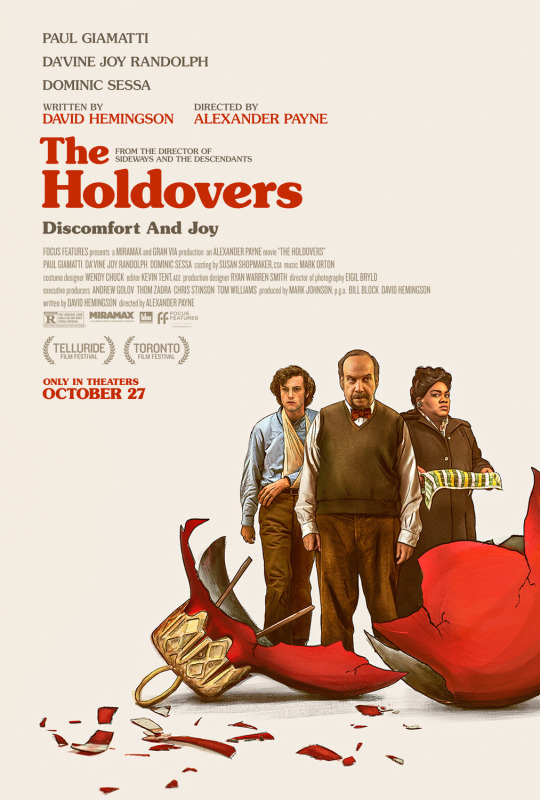
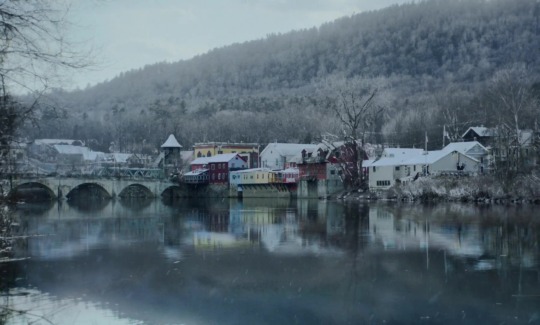

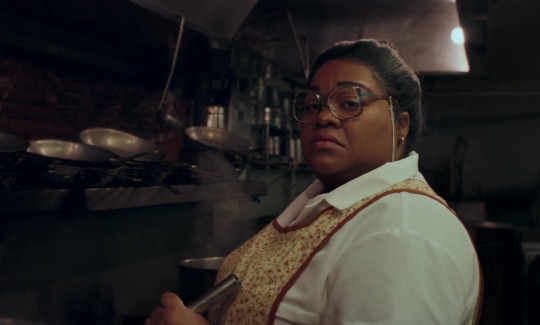

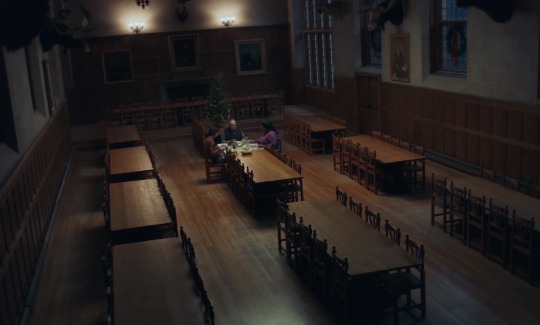
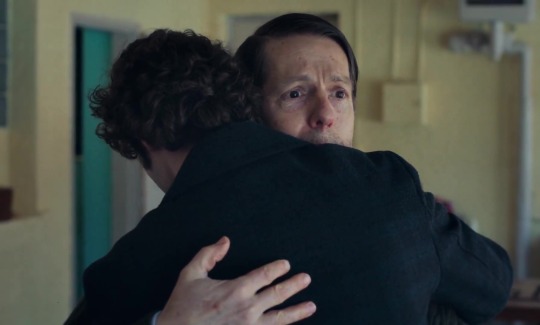

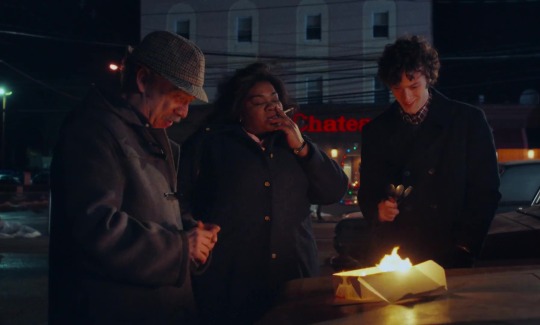


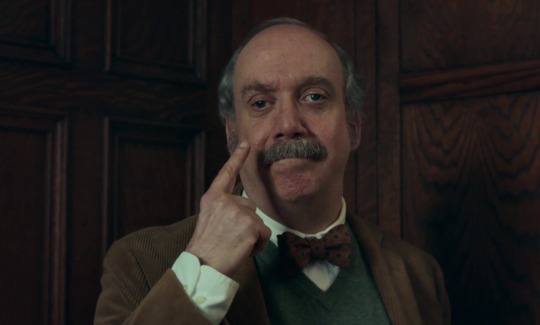
The Holdovers (2023, Alexander Payne)
12/17/23
#The Holdovers#Alexander Payne#Paul Giamatti#Da'Vine Joy Randolph#Dominic Sessa#Carrie Preston#2020s#drama#comedy#indie#70s nostalgia#teachers#high school#boarding school#surrogate parents#Christmas#winter#Massachusetts#Western Massachusetts#mental illness#father and son#history#loneliness#grief#Vietnam War#African-American
13 notes
·
View notes